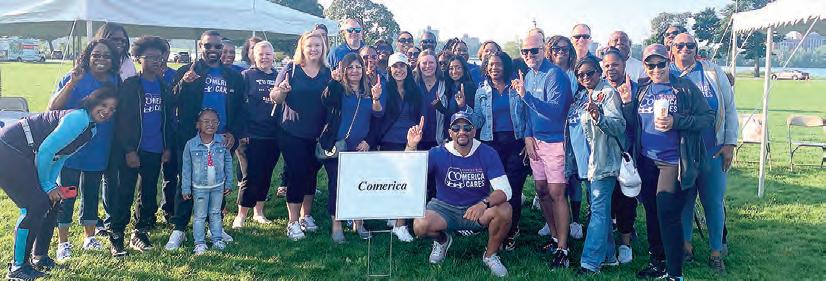
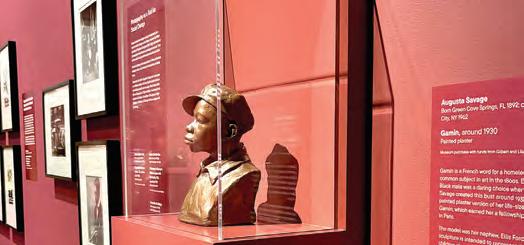




By Ebony JJ Curry SENIOR REPORTER
By Governor Gretchen Whitmer
Earlier this month, I signed my seventh balanced, bipartisan state budget that delivers on the kitchen table issues for all Michiganders. It lowers costs, cuts taxes, fixes the damn roads, feeds kids, protects public health and safety, and grows our economy. I’m proud of the ways that this budget will help your family live, work, and thrive in Michigan.
By Ebony JJ Curry SENIOR REPORTER
Late Thursday night, Sept. 14, a historic moment unfolded in American labor relations as the United Auto Workers (UAW) union initiated a strike against Ford, General Motors (GM), and Stellantis. For the first time, the union took simultaneous action against all three major Detroit-based automakers. The action involves approximately 13,000 UAW members in assembly plants across Michigan, Ohio, and Missouri, who walked off their jobs after existing labor contracts expired at 11:59 p.m.

IShortly before midnight on Sept. 14, GM released a statement expressing disappointment with the strike action, despite offering what it termed an “unprecedented economic package” that included historic wage increases. Stellantis
n a breathtaking celebration of talent, determination, and the unyielding spirit of Black excellence, the Michigan Chronicle marked its 10th Annual 40 Under 40 event Thursday evening. This year’s soirée, drenched in the theme “All Black Everything with Gold Accents,” transcended expectations and essential ly illuminated the golden gems within the true essence of Black excellence. Hosted by the charismatic duo of Andre Ash and Lynzee Mychael from Michigan Chronicle’s Finally Friday, the night was a triumph for the city of Detroit and its vibrant community of young Black professionals.

The evening sparkled with a golden promise as we celebrated remarkable individuals from various walks of life. Among the honorees were the brilliant and visionary co-founders of Detroit Hives, Nicole Lindsey and Timothy Paul Jackson. Their work has not only changed the landscape of beekeeping and urban farming in Detroit but also exemplified the transformative impact Black professionals can have on their communities.
At a moment when so many people are struggling with rising costs caused by global inflation and DC Republican tariffs, the Michigan budget cuts taxes and puts money back in the pockets of hundreds of thousands of Michiganders. It continues to roll back the retirement tax on our seniors, saving half a million households an average of $1,000 a year. It continues the expanded Working Families Tax Credit, which delivers an average combined refund of $3,800 to 650,000 families. But this budget doesn’t just continue old tax cuts. It adds three new ones too. I’m proud that we are ending state taxes on tips, overtime, and Social Security. We want to make sure that seniors, as well as working people in service or manufacturing, can keep more of what they earned.
also expressed disappointment in a statement, saying the company immediately went into contingency mode to protect its operations.
“Entrepreneur of the year – that’s a big deal,” said Brown. “It’s always an honor to be honored and it’s always a blessing to be in a room full of so many talented, accomplished, and popular people that look like me. I’m geeked. I started making and selling clothes as a kid and I always knew that I would have a business, but I never knew it would be Detroit’s brand name business, so I take a lot of pride in the fact that our business represents our city’s pride.”
Greektown Had 1.4 Million Visits This Summer and No Shootings
Taking home the Corporate Excellence Award was Dannis Mitchell, Director of Community Engagement at Barton Malow.
By Ebony JJ Curry SENIOR REPORTER
By Jeremy Allen EXECUTIVE EDITOR
critical moment for Detroit. There’s still more to do.”
DPD Chief James White Says Increased Police Presence Culled Violence By Andre Ash
ness district that had been the lifeblood of the community.
DIGITAL ANCHOR
“Together we have created a social, environmental, and financial impact through bees,” said Jackson. Lindsey followed that sentiment with, “It is through our local partnerships and collaborative efforts that we exist in over 28 plus locations managing the health of 4.5 million honeybees – humbly speaking our movement has inspired others locally, nationally, and even internationally to take on similar missions.”
We’re going to fix more of those damn roads with this budget. For decades, we’ve had bad roads, and Michigan drivers paid the price—almost $3,000 a year per person in Metro Detroit. This budget is the largest roads deal in Michigan history, which includes an additional $2 billion annually. Our budget will fix state and local roads, so your entire drive from your house to work, school, or the store is faster, smoother, and safer. It will also create and protect tens of thousands of good-paying construction jobs.
The UAW has branded the industrial action as the “Stand-Up Strike,” focusing on specific plants within each automaker. UAW President Shawn Fain stated, “This strategy will keep the companies guessing. It will give our national negotiators maximum leverage and flexibility in bargaining. And if we need to go all out, we will. Everything is on the table.” Union leaders have also indicated that additional plants could be targeted in future waves if negotiations remain stalled.
TFor many Detroiters, Interstate 375, or I-375, has long been just another stretch of urban highway, a concrete artery connecting different parts of the city. To some, it’s a mere convenience; to others, it’s an unremarkable part of their daily commute. However, there’s a deeper, far more troubling story beneath the surface of this seemingly ordinary freeway—a story of pain, displacement, and the lasting impact on Black Detroiters.
he first general election debate between Rev. Solomon Kinloch Jr. and Detroit City Council President Mary Sheffield crackled with intensity, as the two candidates clashed over crime, housing, poverty, and the question that’s quietly defined this year’s mayoral race: who can truly deliver for all Detroiters.
Detroit Hives, a pioneering organization founded by Lindsey and Jackson, harnesses the power of urban beekeeping to revitalize neighborhoods in the Motor City. Their initiative not only addresses critical issues like environmental conservation but also provides valuable education and employment opportunities to Black De-
Hosted at the WXYZ studio without any media, spectators, or Detroit residents in the room, the Oct. 15 debate gave voters their first opportunity to see the two square off head-to-head since advancing from the August primary. The format was tight — 90-second openings, one-minute responses, 30-second rebuttals, and 90-second closing remarks — and the exchanges were as sharp as the time limits allowed.
“It is so important to recognize that there are young leaders across the country, many that are born here in Detroit. I represent our city nationally and I tell people, ‘Yea I’m a D-girl I’m from the west-side of Detroit,’” Mitchell expressed. “But more importantly, I’ve been able to have experiences within an industry that not many of us, specifically women of color, have the opportunity to engage in and I’ve been the youngest person in the room, the only Black person in the room, and the only Sistah in the room, and I really had to articulate the importance of showing up, giving chances when others won’t, and being persistent.” As a trailblazing Black woman thriving in a predominantly male-dominated industry, her unwavering commitment to fortifying the connections between businesses and Detroit’s communities is unde-
It’s a history marred by pain, injustice, and economic devastation. More than 130,000 residents, primarily Black, were forcibly displaced. Families were uprooted, generational wealth was obliterated, and a thriving community was torn asunder. The wounds inflicted by I-375 run deep, transcending the physical barrier of a freeway to penetrate the very soul of Black Detroiters.
That contrast — between Sheffield’s argument for continuity and Kinloch’s call for reform — shaped nearly every exchange that followed. When asked how they would address violent crime, particularly among youth, Sheffield leaned into her philosophy of prevention and intervention. She called for “a comprehensive and holistic approach to public safety,” one that increases investment in community violence intervention programs and youth engagement initiatives. “We don’t need someone who calls out problems,” she said. “We’ve heard not one solution (from Kinloch). We need someone who will solve them.”
towards mending the wounds inflicted on Black Detroiters and restoring a sense of belonging that was so callously torn away in the past.
A string of shootings in Greektown in mid-April left both visitors and residents of this bustling downtown destination in awe. One of these shootings tragically claimed the life of a popular and beloved security guard following a dispute with a patron. The male suspect allegedly shot the guard before fleeing the scene, while his female companion is accused of concealing the weapon in her bra.
The I-375 Boulevard Project is about more than just correcting historical injustices; it’s about redefining the future. It will connect downtown Detroit to surrounding neighborhoods, bridging the gap that was placed upon the city decades ago.
Kinloch, in turn, said Detroiters were tired of hearing promises without measurable change. “People in this city are looking for substance, for change,” he said. “Anything she wants to do as mayor, she could’ve done at city council — so why didn’t she?”
By Andre Ash DIGITAL ANCHOR
Our budget also helps kids stay safe, fed, and focused in school. The budget delivers the highest per-student investment in state history for the seventh year in a row. It reduces class sizes, supports teachers, and improves school safety and mental health. It continues free breakfast and lunch for all 1.4 million public school students, saving parents nearly $1,000 per kid, per year. And it continues before and after school programs so young people have a safe place to go where they can do homework, make friends, and stay safe.
This painful legacy can be traced back to the nation’s interstate highway program of 1956—a program that aimed to connect the country but often did so at the expense of marginalized communities. In the case of I-375, it meant carving a path through the heart of Black Detroit, reinforcing segregation, and perpetuating inequality.
Fain clarified the union’s strategy: “I want to give a major shoutout to the thousands of members who are on the picket lines right now fighting for all of us. The Stand-Up Strike is a new approach to striking. Instead of striking all plants at once, select locals will be called on to stand up and walk out on strike. This is our generation’s answer to the movement that built our union – the sit-down strikes of 1937. We told the Big 3 that Sept. 14 was the deadline and we meant it. We gave the companies our economic demands eight weeks ago and it took more than a month to get to the table.”
The tale begins in what is now Lafayette Park, once known as Black Bottom—a neighborhood rooted in African-American culture and history. Named after its dark, fertile soil, Black Bottom flourished during the mid1900s, nurturing the dreams and aspirations of prominent Detroiters like Coleman Young, Joe Louis, and numerous other Detroit legends. But in the name of urban renewal in the 1950s, this vibrant neighborhood was systematically dismantled, erased from the map, and replaced by a lifeless stretch of asphalt.
Kinloch, the longtime pastor of Triumph Church, opened with a striking critique of the city’s direction, pointing to Detroit’s persistent poverty rate, which remains the highest among major U.S. cities, its continued struggle with violent crime, and the rising costs of housing. Each issue, he said, was evidence of “failures of institutional policy” and of leadership too comfortable with incremental progress. He outlined what he called “The Kinloch Promise,” a pledge to expand pathways to quality education, homeownership, and economic opportunity. “Detroiters deserve two things,” he said. “They deserve safety, and they deserve justice.”
A Holistic Approach to Providing Shelter and Support for Detroit’s Unhoused People
That question set the tone for much of the night. When the debate turned to the idea of bringing in National Guard troops to address crime — a question that has prompted visible tension from residents across the city — Sheffield was unequivocal. “I do not believe militarizing our neighborhoods is good for anyone,” she said. “That brings up very unfortunate memories of 1967. We will ensure they are not present in our communities.” Kinloch said he would never invite the National Guard “in a martial law fashion,” but added that he would welcome outside support “if it were offered collaboratively.”
For one to aptly recognize the harm caused by such projects, it is vital to note that some of the planners and politicians behind those projects built them directly through the heart of vibrant, populated communities—oftentimes to reinforce segregation and sometimes as part of a direct effort to replace or eliminate Black neighborhoods.
While the residential areas bore the brunt of this demolition, the heart of Black Bottom, its thriving business center, remained largely untouched. Restaurants, theaters, clubs, and bars—the very places that brought Detroit’s Black community together—were concentrated around Hastings Street, the epicenter of African-American culture in the city.
This budget makes good on one of our core values: that everyone deserves access to quality, affordable health care. After DC Republicans enacted the biggest ever cuts to your health care, this budget protects the over 2 million Michiganders who get their insurance through Medicaid. Our budget will protect $2.7 billion in federal
The union is pushing for a comprehensive list of demands. This
Homelessness continues to plague urban communities, with families and individuals grappling with the challenges of making ends meet in today’s economic climate. Whether it’s struggling to meet monthly mortgage payments or coping with soaring rental costs in a housing market marked by shockingly high prices, a variety of factors contribute to the growing issue of people becoming unhoused.
Housing Resource Helpline in response to the challenges that residents face in navigating the complex system of housing services. The helpline provides a single point of contact for people seeking housing assistance and connects them with the resources they need.
Sheffield, a veteran of city government who has represented District 5 for more than a decade, presented a contrasting tone rooted in experience and steady progress. “I have led with integrity, conviction, and action,” she said, pointing to her work directing more than $60 million in housing investment and hundreds of millions of dollars into programs that have directly led to quality-of-life improvements for residents citywide.
Then, in a cruel twist of fate, Hastings Street, too, was obliterated a few years later, making way for the construction of I-375. This marked the final blow, sealing the fate of Black Bottom and signaling the beginning of the end for Paradise Valley, the Black busi-
While she acknowledged that Detroit still faces significant challenges, she emphasized the momentum she believes the city has built. “We’ve made progress,” she said. “But this is a
Meagan DunnJulie Schneider
Historically, shelters have provided a temporary respite for those in need, often serving as the first or second option after exhausting alternatives like staying with friends or family. Shelters offer a place to rest one’s head and a warm meal, albeit sometimes for extended periods. For others, being unhoused means living in cars or makeshift outdoor settings.
Support for the helpline comes from the Gilbert Family Foundation, which has pledged $10 million over three years to fund the program. Wayne Metro Community Action Agency manages the helpline, making it accessible to all Detroit residents. This initiative simplifies access to the City’s various housing services, ensuring that residents in need can easily find assistance.

By Lynzee Mychael MULTIMEDIA JOURNALIST
The causes of homelessness are as diverse and complex as the individuals experiencing it. In response, the City of Detroit has adopted a holistic approach to combat this issue.
By Ebony JJ Curry SENIOR REPORTER
“Providing services and high-quality housing to persons at risk of or who are experiencing homelessness is a key priority of the City of Detroit, said Julie Schneider, Director of Detroit’s Housing and Revitalization Department.
What a Federal Government Shutdown Could Mean for Detroiters?
“This means focusing on building the pipeline of supportive housing and coordinating with the Continuum of Care on the delivery of critical resources such as emergency shelter, rapid rehousing, and diversion and prevention programs. It also means preserving and expanding affordable housing options for Detroiters of all incomes and improving housing stability though comprehensive service offerings available through the Detroit Housing Resource HelpLine and Detroit Housing Services Division within HRD.”

Today, the resurgence of Paradise Valley stands as a testament to the indomitable spirit of Black Detroiters and the enduring legacy of Black excellence. This historic district, once a vibrant hub for Black businesses and culture, is experiencing a renaissance that harkens back to its glory days. The destruction of Black Bottom may have torn apart a thriving community, but the resolute determination of a new generation of entrepreneurs and visionaries is reclaiming that lost legacy.
These incidents unfolded during an unseasonably warm spring, leading to increased pedestrian traffic and heightened tensions in the densely populated downtown area.
The surge in crime and the influx of visitors to Detroit’s downtown core garnered the attention of the Detroit Police Department (DPD), catching them somewhat off guard.
But now, after decades of enduring the scars of I-375, there is a glimmer of hope on the horizon. Plans have been unveiled to transform this once-divisive freeway into a vision that seeks to right the wrongs of the past while heralding a new era of inclusivity and community revitalization.
The candidates also diverged sharply on how to extend Detroit’s economic recovery beyond downtown. “We have to give our neighborhoods the same chance we’ve given downtown,” Kinloch said. “Resources need to be accessible to everyone.” He argued that despite billions in investment, too many residents still struggle to find affordable homes or family-sustaining jobs. Sheffield countered with examples of her own record, including her creation of a housing fund and expansion of home
James White, Chief of Police for the Detroit Police Department, said: “We were caught somewhat flat-footed right out the gate. By design we went into the spring deployment, which is less than the mid-summer deployment, and saw we say an uptick in violence that first warm weekend.”
Chief White attributes the violence in Greektown to a combination of weather conditions and a surge in population.
Fueled by more than $100 million from the Infrastructure Investment and Jobs Act and other partners, this ambitious project aims to create jobs, remove barriers to economic growth, and reconnect the neighborhood with the rest of Detroit. It is a step
In the heart of Paradise Valley, Blackowned businesses are not just flourishing but thriving, offering diverse services, products, and experiences that pay homage to the past while paving the way for a prosperous future. From jazz clubs to soul food restaurants, the Black Press, and art galleries to fashion boutiques, this revival is breathing life into the very essence of what once made this neighborhood a vibrant cultural epicenter. It’s a resurgence that extends beyond brick and mortar; it represents the resurgence of a spirit that refuses to be subdued.
Detroit City Councilman Fred Durhal III, representing District 7, where Eastern Market resides, told the Michigan Chronicle, “It’s still very early in the process, MDOT is
He explained, “ We saw numbers downtown that we have not seen, ever. People are emerging from COVID and there’s a feeling that we’re in a post-COVID era… and with the venues downtown and the reasons to come down with all the activities that are going on, we saw hundreds of more people and, in particularly, young folks, teenagers that we hadn’t seen.”
Responding swiftly to the surge in violence, DPD adjusted its deployment plans. Rather than waiting for mid-summer, they deployed officers in the spring itself to address the situation.
“The city and its partners offer a lot of great services to help Detroiters with their housing needs, but they don’t mean much if people don’t know how to access them,” said Mayor Mike Duggan. “Thanks to the efforts of our partners and the generous support of the Gilbert Family Foundation, we now have a simple process to guide residents to the right housing resource and a growing number of programs to help them.”
In Wednesday night’s WXYZ mayoral debate, Mary Sheffield and Rev. Solomon Kinloch Jr. confronted a central question from anchors Carolyn Clifford and Chuck Stokes: “How will your administration combat poverty?”
In May 2023, the City of Detroit launched the Detroit
From the days of the Great Migration when thousands of Black families flocked to Detroit in search of jobs and a better life, to the pivotal role they played in the city’s cultural and musical heritage, Black Detroiters have left an indelible mark on the city. However, in recent years, Detroit has experienced significant gentrification, which has raised concerns about the displacement of long-standing Black residents. Similar to a setting sun, there’s a rising spirit, and Black Detroiters are reclaiming their place in the city, despite the challenges posed by gentrification.
The Gilbert Family Foundation’s broader commitment involves pledging $500 million to support projects across Detroit over the next ten years, with housing initiatives being a significant part of their contribution.
Notably, Detroit has witnessed a consistent decrease in recent years, with the number of unhoused residents steadi ly declining. In 2019, approximately 7,847 people were unhoused and entered the City’s community response system. In 2021, about 5,687 people experienced homelessness.
Rather than default to policing or infrastructure, both candidates pivoted toward child-centered financial proposals — Sheffield invoking the Rx Kids model, and Kinloch unveiling his “Kinloch Promise,” a children’s trust fund of $1,000 annually until age 18. Sheffield declared, “We are looking forward to exploring Rx Kids program to Detroit that provides direct funding to pregnant moms.”
According to the City of Detroit, since the start of the fiscal year 2019 to 2021, Detroit saw a 28% decrease in the

The rise in visitors to the Greektown area is evident in data from Placer.ai, a location analytics company specializing in visit trends and demographic insights through geolocation-enabled mobile devices. From May 1-Aug. 27, 2022, there were 1.3 million visits and 655,000 visitors to Greektown, according to Placer.ai. In the same period this year, these numbers increased to 1.4 million visits and 670,000 visitors.
As Detroit’s downtown area continues to attract both residents and visitors, the police department has implemented various enforcement measures to manage the increased population. Notably, metal detectors have been strategically placed throughout Greektown to deter the illegal carrying of firearms.
because of discrimination, but they were also coming because Black people was doing some stuff. When did Black people start doing things in the city? They started doing things in this area in the 1800’s. In the 1800’s the major thing that they were doing in Detroit is they were the leaders in the fight against slavery. The Underground Railroad is
“Raise Healthy Families & Thriving Kids” as a core pillar of his platform.
Sheffield’s invocation of Rx Kids isn’t rhetorical: the program is real and expanding throughout Michigan. Originally launched in Flint in 2024, Rx Kids delivers $1,500 during pregnancy and then $500 per month for the baby for six to twelve months.
“We have strategically placed them at key points, “ Chief White explains. It has been a deterrent for some, and some have tested it. If you are legally carrying a weapon and carrying a CPL, have a great day. If you’re
During the Great Migration, thousands of Black families from the South came to Detroit in search of jobs in the booming automobile industry. Despite facing discrimination and segregation, they built vibrant communities on the city’s east and west sides. Over time, these neighborhoods became centers of Black culture and entrepreneurship.
On her campaign website, Sheffield frames her candidacy around
supporting families, expanding services, and aligning city resources to uplift the most vulnerable.
According to Historian Jamon Jordon Black resilience in the city has roots that extend far before the Great Migration and will persist
long after our current phase of gentrification.
Kinloch said: “The Kinloch Promise will include a children’s trust fund where every baby born in the city of Detroit will receive a seed of $1,000. It will be allocated on a yearly basis up until that child gets to the age of 18 and they can use that to open a business, to go to college, start a career, buy a home or invest into their community.” His campaign site outlines
“Black people were coming to Detroit because Black churches were here, black schools were here, and its was Black businesses here,” said Jordon. “They were coming of course
The program has already been adopted in multiple Michigan communities such as, Flint, Pontiac, Kalamazoo, and parts of Michigan’s Upper Peninsula, and aims to reach dozens more communities in the coming years delivering more than $15 million in cash prescriptions to over
cine and healthcare, may be adversely impacted by
what the Supreme Court
women been premoment of the final. a law1931 law effect, asked the affirm that constitucontain abortion. Our Planned Advocates of founding coalition
ReproducAll, a affirm abortion and freedom in constitution,” Giroux. is that everything in aborMichigan, makes we will we can patients care they



to have representalegislacollection and criminal jusrecomcollection analywith the AttorMichigan Law Standards Association Prosecutors stakeholders collect and strategically. warHouse Operations hearand other would ban of noknock urging the pass reform and Whitmer to the leg-
funding for hospitals in underserved areas so people don’t have to travel far to get the care they need. The budget also invests tens of millions in specialized services grants which provide transit support for seniors and people with disabilities.
spectrum. With the potential to drive both foster and adoption numbers upward, a ban on abortions could leave many women to choose a less safe route restoring ‘back alley’ and illegal abortion practices, including self-abortions. Moreover, African American women and women of color, who already have a long-storied history with access and inclusion in medi-
become a parent is cen tral to building and living a healthy, happy life,” said Vasquez Giroux.
Finally, public safety. Everyone deserves to go to school, work, church, or home without fear. The budget builds on the more than $1.6 billion we’ve invested to fund first responders and protect public safety by helping local communities continue to hire and train police officers, firefighters, and EMS workers. We’re going to keep working together to keep people safe, save lives, and drive down crime.
islature adopts it.
repair grants. “What we’re defining as affordable has to be affordable for everyone,” she said. “We’ve built up downtown, and now we’re investing in neighborhoods by action, not words.” But Kinloch pressed further, asking, “Affordable to who?
The median income in Detroit is less than $40,000 a year. You’re telling me you’ve invested $1.5 billion in affordable housing?” Education, a topic often considered outside the mayor’s formal jurisdiction, emerged as another point of contention. Kinloch said that while the Detroit Public Schools Community District operates independently, the city’s leadership still bears responsibility for the academic health of its young people. He promised to appoint a Chief Education Officer to coordinate the city’s role in supporting K-12 progress, and he proposed an ambitious plan to provide every child in Detroit with a seed investment fund — money they could access at age 18 for college, entrepreneurship, or homeownership.
Increase school funding: Statutory changes to increase the School Aid Fund revenue by at least $3.6 billion and establish a permanent weighted funding formula based on student and community needs and universal preschool (0-3).
Reject censorship in history instruction: Encouraging Gov. Whitmer to ensure the goal for Michigan schools should be history instruction that is presented by professionals with the subject matter expertise, pedagogical skills, and judgment necessary to present complex information to students that are grounded in provable facts and add to the understanding of modern-day America.
Sheffield called for closer partnerships with schools to strengthen wraparound services, improve after-school programs, and support families. She framed her approach around the same principle she said guides her leadership: investing in people “from cradle to career.”
Beyond the scope of pro-choice versus prolife, the fight for reproductive choice is one of freedom. As Michigan officials work to ensure each woman who finds herself in the position to choose has access to care without the threat of legal action, many wonder
turn toward transparency and ethics that brought the most personal moments of the night — moments that laid bare the animosity that’s simmered between the two campaigns for months. When asked about restoring trust in city government, Kinloch invoked Detroit’s history with political corruption and promised to establish a Chief Compliance Officer to ensure city operations remain “above board.” He referenced reports alleging Sheffield received free concert tickets, saying, “We cannot go back to corruption in leadership.”
I’m proud of this bipartisan budget and the work it does to help more people, families, and small businesses build a good life in Michigan. This budget is a statement of our values and our vision for Michigan as a place where everyone, no matter who they are, where they’re from, or how much money they have in their pocket, can thrive. Let’s build on this progress and keep getting things done.
wife,” he said. “We could do great things together if you weren’t so adversarial.”
The health committee recommends reviewing state licensure policies to address the barriers that Black psychologists face in obtaining licensure in Michigan.
Ensure equitable distribution of state health funds: Ensure all Michigan communities with a significant Black population receive adequate funds to address mental health issues.
Sheffield swiftly rejected the claim as “wrong and inaccurate,” and accused Kinloch of hypocrisy. “I’ve led this city for 12 years,” she said. “Every step of the way, we’ve led with integrity.” She then turned the scrutiny back on him, referencing past reporting that his church had purchased his home and later sold it to him at a discounted rate.
Increase mental health supports for the Black community: Recommending Michigan set a goal of increasing the number of Black mental health service providers by 20% each year over five years.
Their exchanges reached a boiling point as Kinloch accused Sheffield of operating from a place of privilege, saying, “The tenor and tone of this campaign shows why it’s dangerous to have people of privilege in power.” Sheffield fired back that Kinloch’s campaign had become more divisive than visionary. “You said you don’t have to tear down to build up,” she reminded him, pointing to a debate during the primary election in which both candidates participated. “I guess you don’t practice what you preach.”
Protecting Black voting rights: Urge state officials to remain vigilant in the fight against schemes to disenfranchise Michiganders of color.
“BLAC members have worked hard to identify the needs of the Black community and we feel these recommendations will provide a solid first step towards breaking down barriers in education, community safety, health and business,” said BLAC Co-Chair Dr. Donna L. Bell.
leadership,” strengthening city services, and rebuilding trust in City Hall.
By the time closing statements arrived, the contrast was unmistakable. Sheffield’s tone was measured and forward-looking. “We’ve come a long way in the past 12 years, and it’s been an honor to serve you,” she said. “We’ve accomplished so much, but I believe our best days are ahead of us. Tonight we’ve heard misinformation, divisiveness, and no specifics — Detroit deserves better.”
Kinloch, standing firm in his critique of the status quo, ended where he began: with a focus on inequity.




location in the 2025 state budget, intended to scale and reach toward 100,000 babies over three years. In Flint alone, Rx Kids reported over $11.3 million prescribed and enrollment of more than 2,000 families. Early impact evaluations in Flint show improvements in birth weight, reduced NICU admissions, and positive mental health effects among mothers. The Michigan State University pediatric public health initiative, in partnership with GiveDirectly and Poverty Solutions at the University of Michigan, administers the program. By referencing Rx Kids, Sheffield is signaling she intends to bring a tested, evidence-based cash support model to Detroit. But her campaign stops short of fully specifying funding sources, oversight, or phasing — a gap she’ll need to fill in forthcoming policy rollouts. Kinloch’s trust fund promise, by contrast, is more conceptual at this point.
His site describes the Promise as an investment in children’s financial capital from birth onward — part of a broader agenda that includes jobs, housing, and economic inclusion. But his campaign does not yet publish line-item fiscal plans, revenue mechanisms, or administrative frameworks for how that $1,000 annual deposit would be funded or managed at scale across Detroit.
But it was the debate’s
people believe that they need to for themselves
“I didn’t have the city’s piggy bank,” Kinloch shot back, while accusing activist Robert Davis of running a “smear campaign” against him on Sheffield’s behalf. The back-and-forth grew tense. “He’s been virtually absent this entire campaign,” Sheffield said, saying Kinloch has chosen to skip key community meetings and mayoral discussions as a way to not be challenged publicly on his policy proposals. Kinloch bristled. “You’ve attacked me, my church, and my

Still, amid the tension, moments of policy substance emerged. Sheffield called housing a “human right” and said she would continue lowering property taxes while holding slumlords accountable. Kinloch emphasized Detroit’s staggering poverty rate — more than 34 percent overall, and more than half of its children — and said his administration would prioritize economic mobility for residents of all ages.
Both were asked what they would do on their first day in office. Kinloch said he’d begin by evaluating top leadership to ensure they were “ready to do something courageous,” then immediately engage Lansing to secure additional funding, then meet with residents to set priorities. Sheffield said that within her first 100 days, she’d focus on ensuring “effective and efficient
BLAC will hold a virtual town hall meeting to discuss its policy recommendations on Thursday, May 12 at 4 p.m. Join BLAC and a virtual audience in discussing the recommendations to support the Black communi-
“Despite everything my opponent has said she’s done, the poverty rate is still over 50 percent,” he said. “We need to build a city that’s not just working for some. We need to build a city that’s working for everyone.”
The debate ended with both sides firmly standing their ground and neither side backing down to the other’s disingenuous remarks about their service to the city. But on thing became even more certain: Detroit voters are choosing between two starkly different visions of leadership. One candidate is rooted in continuity and cautious progress, while the other wants disruption and reform. As Election Day approaches, both Kinloch and Sheffield will have to convince residents not just that they care about Detroit’s future, but that they understand how to reach it.
Still, the framing shift is significant.
To learn more about BLAC and this upcoming event, visit www.michigan.gov/BLAC. embraces. transforleadership as a approach that change the syscircumstancoperating Ivory “Transformationdoesn’t just do certhem view of and exdrive that because what create everyentire because
has elevated WCCCD to become nationally recognized for excellence and innovation and preparing our students professionally and personally to do great things in the world.”
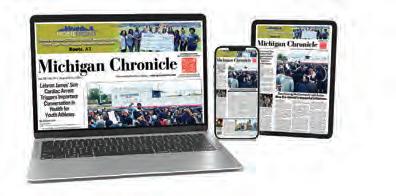

During the debate, neither candidate fully resolved the same set of practical questions: Will funding come from new taxes, philanthropic partnerships, or city reallocation? Will the programs be universal or means-tested? Who will oversee and audit disbursements and prevent misuse? How will benefits be fairly distributed across Detroit’s most underserved neighborhoods?
Detroit’s next mayoral race is no longer solely about crime, blight, or transit — it’s also about how much the city will invest in its youngest residents from day one. Sheffield’s campaign emphasizes applying Rx Kids as a first step, integrated with coordinated social services, early education, and a proposed “Office of Human, Family, and Homeless Services.”
Kinloch’s campaign presents generational capital-building as the linchpin of his vision, rejecting incrementalism in favor of structural empowerment.
Detroit’s mayor lacks direct control over state welfare, federal programs, or education funding but the office can marshal partnerships, set priorities, and signal political will. In invoking cash support from pregnancy through childhood, both candidates stake a claim on redefining how the city supports its families.
As November draws near, Detroit voters will need specificity on how each candidate plans to raise the city’s youth from poverty and better understand which plan could realistically scale in a fiscally constrained city. Which design ensures accountability, equity, and sustainability? Whose vision treats children born in Detroit not as future beneficiaries, but as asset holders from day one? From
BLAC is housed in the Michigan Department of Labor and Economic OpMembers represent many professional backgrounds, including economics, law, public safety, health and wellness, arts and culture and media. They leverage their experiences and expertise to make recommendations to the governor on critical issues affecting the Black community.
Federal Public Law 98-435 requires that polling places be accessible to disabled voters.
If a polling location is not disabled accessible, this law allows the assignment of an alternate polling place. However, several polling places which were previously inaccessible are now accessible to disabled voters.
Disabled voters are entitled to vote at the polls within the precinct where possible. Pollworkers are obligated to provide whatever assistance is needed to facilitate the voting process.
Disabled voters with an inaccessible polling place are eligible to vote without notice at the:
Department of Elections
2978 W. Grand Blvd. Detroit, MI
until the close of voting at 8:00 p.m. on Election Day.
If additional information is needed, or to confirm disabled accessibility, please contact the Department of Elections office at (313) 876-0190.
Janice M. Winfrey City Clerk & Chairperson
Detroit
Election Commission
A3 | October 22-28, 2025

DTE Energy is working to build a stronger and smarter electric grid in Detroit. The company is delivering on that commitment by focusing on four main categories of work.
First, DTE is accelerating transition to a smart grid, including installing more than 140 smart devices to the electric grid in Detroit this year alone. These devices help to isolate outages and alert DTE’s operations center when wires are down, so crews can restore power more quickly. The equipment also de-energizes downed power lines to help keep people safe.
Second, DTE is upgrading and improving existing electric infrastructure. The company is replacing more than 250 miles of electric equipment throughout the city with upgraded poles, power lines, transformers and other electric equipment. This equipment is stronger and can better withstand increasingly severe weather and winds.
Third, DTE is rebuilding significant portions of the electric grid – spending hundreds of millions of dollars to strategically rebuild infrastructure in certain parts of the city. These projects often involve building new, larger substations and completely replacing the equipment that delivers power to customers.
Lastly, DTE knows that trees falling into and damaging equipment account for half the time customers spend without power. The company expects to trim and remove trees along 340 miles of its electric equipment that delivers power to Detroit this year.
This is all part of DTE’s commitment to reducing outages by 30% and cutting outage durations in half by the end of 2029. Find out where work is happening in your community at dteenergy.com/powermap.
If you’re worried about staying on top of your bills this winter, help is here.
As of October 1, qualified Michigan residents, can apply for expanded financial help with their electric and gas bills. Whether you’re behind on payments or just need extra support, there are programs designed to help you stay safe and warm.
DTE Is Here to Help You Stay Connected
No one should have to go without power. If you’re struggling to pay your bill – or think you might soon – please reach out right away. DTE Energy is here to help you find the support you need. While customers can reach out at any time, October marks the beginning of the new fiscal year for Michigan Energy Assistance Program (MEAP) and a variety of other energy assistance programs. This year, not only will additional funding be available, the eligibility has also expanded providing access to more Michiganders than ever before. Call DTE at 800-477-4747 | Visit dteenergy.com/help
Here are some of the financial assistance and payment support programs available:
Financial Assistance
• State Emergency Relief (SER)
If you have a past-due bill or a shutoff notice, SER can help right away. Call 2-1-1 or visit newmibridges.michigan.gov
• Michigan Energy Assistance Program (MEAP)
You may also qualify for help through MEAP. In addition to energy assistance, this program also teaches budgeting and energy-saving tips. Visit michigan.gov/energyassistance
➤ Michiganders earning up to 60% of the state median income (approximately $70,000 annually for a family of four) are now eligible for MEAP funds.
• Home Heating Credit You may be able to get a credit on your taxes to help with heating costs. Contact United Way or Accounting Aid Society for help.
➤ File between January and September 2026
• Residential Income Assistance Credit
You may qualify for a monthly discount on your bill. Visit dteenergy.com/help
Payment Plans
• Low-Income Self-Sufficiency
DTE is working in Detroit and other Michigan communities to upgrade the
that
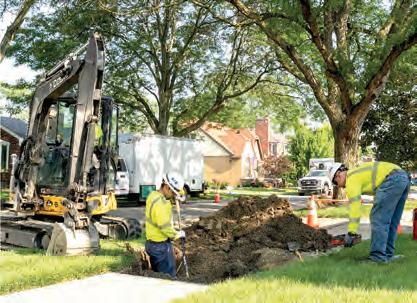
What to expect if upgrades are scheduled at your property
• You will receive a series of notices in the mail several weeks before work begins.
• Once construction is underway, crew members will keep you informed in person – via door knocks – and with door hangers.
• Crews will start their work by digging under the right of way or street in front of your home or businesses and installing new main lines.
• Next, they will move indoor meters outside, replace the line that runs from the main to your property’s meter and reconnect natural gas service.
• You will be notified in advance about expected service interruptions and crew members will knock on your door afterwards to come inside and relight your appliances.
• Visit dteenergy.com/natural-gas-upgrades for more information.
Property is restored to its original condition
After all construction is completed, concrete and landscaping crews will repair affected sidewalks, driveways and lawns.
• For work performed May-October, DTE will permanently repair sidewalks, driveways, landscaping and lawns within 30 days of completing construction in the area.
• For work performed November-April, DTE will put in temporary repairs to take you safely through the winter. Then, return to make final repairs when weather permits and finish them by June 30.
• Visit dteenergy.com/repairs for details.
If you have specific questions about GRP work, call our direct line at (313) 270-9240.


By Michigan Chronicle Editorial Board
The Michigan Chronicle, Detroit’s longstanding voice of the community, is increasing its price for the first time in nearly two decades. Starting next month on Nov. 5, 2025, the cost of a single issue will rise from $1 to $2. This change comes as part of an industry-wide shift in response to the evolving media landscape, while maintaining our commitment to providing quality journalism to our readers.
Since our founding, the Michigan Chronicle has remained dedicated to serving the Detroit community with accurate, insightful, and relevant news. Over the years, we’ve worked tirelessly to keep our prices affordable for all readers, even as operating costs have steadily increased. In fact, the last time our price was adjusted was nearly 20 years ago. As the cost of printing, distribution, and news gathering continues to rise, this modest price increase ensures that we can continue to invest in high-quality journalism without sacrificing the integrity of our content.
Despite the price adjustment, the Michigan Chronicle remains one of the most affordable publications in the area. We recognize that many of our readers rely on us for news that speaks directly to their lives, their community, and their concerns. Our goal is to ensure that price does not become a barrier to access, and we believe this modest increase is a necessary step to continue providing the high standards our readers expect.
We’re also proud to offer free and accessible content online. While print prices are adjusting, our digital presence remains entirely free of charge, ensuring that anyone with internet access can stay informed on local and national news without any added cost. Our website and social media channels remain vital parts of our mission to make news available to as many people as possible.
This price change is part of a broader transformation within the media industry, as traditional print journalism adapts to new economic realities. The Michigan Chronicle will continue to evolve with these changes, but our commitment to serving our community remains the same. We thank our loyal readers for their ongoing support and look forward to continuing to inform and inspire our city for years to come.
By Sam Robinson SENIOR REPORTER
Triumph Church Rev. Solomon Kinloch cast a dark shadow over the prospects of a potential Mary Sheffield administration during the first televised debate.
Sheffield didn’t hold back on the pastor’s absence in the community during candidate forums leading up to the August primary election, questions surrounding how he purchased his Oakland Township home and his lack of political experience.
The gloves were off after Sheffield suggested Kinloch doesn’t live in Detroit in response to criticism over whether city resources have reached neighborhood residents — one of the key issues since the race began earlier this year.
Sheffield and Kinloch went back and forth over their past successes and community givebacks, at one point Kinloch suggested Sheffield and her father, Rev. Horace Sheffield, have benefited from Triumph Church.
Sheffield repeatedly accused Kinloch of being absent from community work and lacking specific solutions to address the problems she said she has plans for. Kinloch argued Sheffield has been part of a leadership group that hasn’t meaningfully changed the lives of residents.
The debate was filled with personal criticisms as candidates accused the other of ethical lapses and not truly understanding or working for Detroit’s neighborhoods.
Here are the moments that caught our attention:
Kinloch criticizes Sheffield over public safety
Kinloch suggested the police department could be “fudging the numbers” in order for city politicians to champion crime reduction statistics.
“The reality is, anytime you have a department that’s grading their own tests, you’re going to have a problem with the fudging of the answers and the fudging of the numbers,” Kinloch said.
Sheffield urged voters to “resist unfortunate misinformation and false statements.”
“Public safety and leadership has been one of the most challenging things that I’ve had to uncover seeing the devastation that it causes our communities and our families,” Sheffield said. “No one should feel unsafe in their home and in their neighborhoods. Now, while we’ve had historic record lows of crime in Detroit, and just this year alone, we’ve seen a reduction in all categories of violent crime compared to last year. We know that one life lost is still far too many.
Sheffield said she would invest in preven-

tion, saying she believes in a comprehensive and holistic approach to public safety that is rooted in strong partnerships with our law enforcement agencies in our community. Kinloch open to federal collaboration in Detroit
Sheffield said she would not welcome National Guard troops “We know that the National troops causes some very, very unfortunate memories of 1967, and we do not want to go back.”
Kinloch says he would work with the National Guard, “Not in a martial law fashion, but in collaboration, in order to make sure that we’re protecting soft spots throughout the city of Detroit — we have a problem.”
Kinloch wants city resources to reach everyone, small businesses and residents in the community in a similar way as downtown. “We need to give our neighborhoods a chance like we’ve given downtown all the chances.”
Sheffield accuses Kinloch of being absent
“I know it takes about an hour and a half to get from Oakland Township to Detroit to know what’s happening on the ground,” Sheffield told Kinloch Wednesday. “While you’ve been building up Southfield, you could have been helping build up Detroit.”
“Where you own a home,” Kinloch interjected, referring to the Southfield condo Sheffield inherited from her mother.
The pastor has received criticism for moving to Detroit ahead of his mayoral run, though he has said his heart has always been in Detroit. Kinloch, who grew up in poverty in Detroit, told Sheffield at one point during the debate that Sheffield sounded privileged.
Sheffield also criticized Kinloch for not showing up to candidate forums.
“He’s been virtually absent this entire campaign, with a sense of entitlement, not showing up to community meetings and forums with respected leaders in our community — I think that Detroit does deserve better,” Sheffield said.
Kinloch’s main criticism of his opponent Wednesday pointed to the fact that the city’s problems have persisted despite Shef-
field’s leadership on council.
“Everything she’s saying tonight that she has done — it has not gone far enough to change the experiences of the people that live in the city,” Kinloch said. “That’s why people like me are stepping up and standing up, because the people that sit in these seats have not delivered for us.
“We have a pastor who has not built one unit of housing,” Sheffield said.
Both candidates defend record
Kinloch: “It is disingenuous for you to assault me and my church for all of the work that you know we’ve done in this community, even helping you and your father, Triumph church and Solomon Kinloch have done more for this community than anybody you know. And if you talk to the citizens of this city, they’ll tell you that what you’re saying is disingenuous and it’s a flat out lie.”
Sheffield: “I also think it’s disingenuous of you, Pastor to sit here and insinuate that I’ve done nothing for this city. For 12 years, I’ve been on the front line delivering for this city over 20 pieces of legislation, a true record of people progress and prosperity. and not one time as your council member who represents your district, where your church resides had you come to our office have you come to a council meeting, have you raised concerns around housing property tax reform, infrastructure, transit, you’ve been completely silent.”
Kinloch: “The tenor and tone of my opponent tonight reminds people the danger of having individuals who are privileged to sit in these seats of power reminds people the danger of having individuals who are privileged to sit in these seats of power.”
Sheffield: “I have no need to try to tarnish his reputation or to go after him. I think voters in this city have been very clear the way they showed up in this last election. I’ve engaged with them and will continue to show up and engage with our voters. You know, the pastor indicated at the first debate that construction doesn’t happen by destruction and that you don’t have to tear someone lese down to build someone else up. But that is exactly what you’ve been doing.”
Kinloch: “You have attacked my church, you have attacked me, you’ve attacked my wife, you’ve attacked every good work that we’ve done in this community, and I have not attacked you. This is not the type of leadership this city needs. Yes, we are opponents and we’re in opposition, but we’re not enemies. We have both done great things, and we can do great things together, if you weren’t so adversarial about it.”
You can reach Sam at srobinson@ michronicle.com.
A5 | October22-28, 2025
By Anthony O. Kellum
CONTRIBUTING WRITER

The mortgage and real estate industries are undergoing a major transformation. Artificial intelligence, digital mortgage platforms, and fintech innovations are changing the way people buy, sell, and finance homes. For the Black community, this technological revolution represents both an opportunity and a warning. While these advancements can make homeownership more accessible and efficient, they can also deepen existing disparities if access, education, and inclusion don’t keep pace.
Technology’s Growing Role in Homeownership
Technology has redefined how we approach real estate. From online pre-approvals and automated underwriting to AI-driven home valuations, today’s mortgage process can be completed in days rather than weeks. Virtual tours, e-signatures, and digital closing platforms have made the buying experience more convenient and transparent.
Fintech companies are also expanding access to mortgage credit by using alternative data like rent, utility payments, and even subscription history to evaluate borrowers who might otherwise be overlooked by traditional banks. For Black borrowers, who are more likely to be “credit invisible” or lack lengthy credit histories, these innovations can open new doors to homeownership that were previously closed.
The Double-Edged Sword of AI in Lending
While AI and automation promise fairness by removing “human bias,” the reality is more complex. Algorithms learn from data and if that data reflects decades of systemic discrimination, the results can replicate those same inequities. Studies have already shown that AI-driven underwriting systems and automated valuation models sometimes undervalue homes in predominantly Black neighborhoods or deny credit at higher rates to Black applicants.
This makes digital literacy and advocacy essential. As technology becomes the gatekeeper to financial opportunity, the Black community must be equipped not only to use these tools, but to question how they work. Understanding how credit scoring algorithms, digital underwriting systems, and appraisal models operate is the new form of financial empowerment.
Opportunities for the Black Community
The good news is that technology, when used intentionally and inclusively, can level the playing field. Here’s how:
• Digital Mortgage Access: Online mortgage comparison tools allow borrowers to shop for the best rates and programs without relying solely on traditional banks. This means greater transparency and potential savings.
• Alternative Credit Models: New fintech platforms are incorporating rent, utilities, and even phone bill payments into credit scoring models helping those with limited credit histories qualify for loans.
• Blockchain and Transparency: Blockchain technology can make property records more transparent and secure, reducing fraud and ensuring fair appraisals in undervalued Black neighborhoods.
• Remote Work and Virtual Real Estate Access: The rise of remote work allows families to explore affordable housing markets outside of high-cost urban centers while maintaining employment, expanding the range of ownership opportunities.
Cybersecurity and Financial Protection
With convenience comes risk. As more homebuyers move online, cyber threats have increased from phishing scams to wire fraud during closing. The Black community, often targeted by financial scams, must be particularly vigilant.
• Always verify wiring instructions by phone with your title company or lender before transferring money.
• Use secure, encrypted platforms when sharing sensitive documents.
• Regularly update passwords and enable two-factor authentication on financial accounts.
• Be cautious of unsolicited messages or “too good to be true” loan offers online.
Tips for Using Technology to Build Ownership Power
• Use Comparison Platforms: Explore multiple lenders and loan options through online comparison tools to find competitive rates and programs tailored to your situation.
• Embrace AI Credit Tools: Use apps that monitor and improve your credit in real time by analyzing spending habits, payment history, and debt ratios.
• Take Advantage of Virtual Education: Many lenders and housing nonprofits now offer virtual workshops, webinars, and simulators that teach everything from budgeting to buying.
• Stay Informed on Fintech Trends: The next generation of wealth will be built through understanding how data and technology shape opportunity. Subscribe to newsletters, follow credible mortgage news, and engage with platforms that promote digital equity.
What It Means for Black Homeownership
The future of homeownership will be written in code through algorithms, digital platforms, and data-driven decisions. If the Black community doesn’t actively engage with these tools, we risk being locked out of the next frontier of wealth-building. But when we learn, adapt, and participate, we can harness technology to not only access homeownership, but to redefine it.
Property is Power and in this new digital era, knowledge is the key that unlocks it. When we combine technology with education, advocacy, and financial readiness, we don’t just keep up with the future we shape it.

By Ebony JJ Curry SENIOR REPORTER
For years, Detroiters passing through Corktown have watched the steady rebirth of Michigan Central Station, the same building that once symbolized decline now pulsing with possibility again. The next chapter in that revival could bring something the city hasn’t seen in decades: trains pulling into the station once more.
State and local officials announced plans Wednesday for a new $40 million multimodal transit hub on the Michigan Central campus that would reconnect Detroit to Windsor, Toronto, and Chicago by 2029. The announcement, made during the Downtown Detroit Partnership’s Fall Forum, confirmed that the Michigan Department of Transportation, the City of Detroit, and Michigan Central have entered a memorandum of understanding to move the project forward.
Governor Gretchen Whitmer said the hub represents more than infrastructure — it’s a statement about regional unity and shared progress. “At a time when the world is rife with division, this hub — just like the Gordie Howe Bridge — will be a symbol of the good that comes when we work together,” Whitmer said.
The partnership aims to restore rail service through Michigan Central for the first time since Amtrak trains left the depot in 1988. Early projections estimate the new line could serve more than 66,000 passengers annually, linking universities, businesses, and neighborhoods across the Great Lakes corridor.
Amtrak and MDOT officials said the plan uses existing tracks and tunnels to bridge a nine-mile gap between Detroit and Windsor. The system would begin with a single daily round-trip route between the two countries, with potential to expand service as demand grows.
“This really brings significant service improvement for minimal capital investment,” said Arun Rao, senior director of network development for Amtrak. “We’re leveraging two well-established services on either side of the network — essentially bridging a nine-mile gap.”
Environmental consultations and engineering studies are scheduled for 2026, with service potentially launching by 2028 or 2029 depending on funding. Plans call for a new terminal on one to two acres within the Michigan Central Innovation District. The space would feature a shared lobby for train and bus passengers, limited retail, and a parking structure.
The project also proposes relocating regional bus lines — including Greyhound, Indian Trails, and Baron’s Bus — from the aging Howard Street Station to the new facility, further centralizing Detroit’s transit access in the city’s west downtown area.
Officials say the hub will complement, not replace, Amtrak’s existing New Center station. At launch, the Michigan Central site will handle primarily cross-border routes to Windsor and Toronto, but the long-term vision extends beyond the Detroit-Windsor line — creating a modern network that strengthens mobility across the region.
“This project connects jobs, talent, and opportunity on both sides of the border,” said MDOT leaders. “It ties Detroit’s growing innovation economy to a global movement of collaboration and development.”
The Michigan Central campus, restored by Ford Motor Company as a hub for mobility and technology, has become a symbol of Detroit’s resurgence. The return of passenger rail service, decades after trains stopped running, reinforces the city’s comeback story with a focus on equitable growth and regional connectivity.
Urban planners and economic developers see the investment as a chance to expand transit access for Detroiters while creating new opportunities for business and tourism. Officials estimate the project could help attract new employers, support construction and hospitality jobs, and strengthen academic partnerships among more than 30 universities in the region.
As Detroit continues to reimagine mobility from autonomous shuttles to EV manufacturing, the vision of trains once again rolling into Michigan Central adds another layer to the city’s transformation. For many longtime residents, it shines a light on the restoration of connection — across borders, across industries, and across generations.
By: Ebony JJ Curry SENIOR REPORTER
After weeks of uncertainty and missed deadlines in Lansing, Michigan families can finally see results. The state’s new education budget, approved after lawmakers missed the constitutional deadline for the first time in over a decade, restores stability to classrooms and cafeterias alike by extending free breakfast and lunch to every public school student statewide.
The delay left parents and educators across Detroit anxious about whether the meals that fed more than a million students last year would continue this fall.
Governor Gretchen Whitmer’s signature on the bipartisan $24.1 billion education budget locks in that continuation, saving Michigan families an average of $1,000 a year. For Detroit’s 50,000+ public school students, it ensures uninterrupted access to a program that many households depend on and for a district where over half of Detroit’s children live below the poverty line, it provides something schools cannot teach without: consistency.
The FY2026 Education Omnibus Budget, detailed in Senate Bill 166, represents one of the largest state investments in public education in Michigan’s history. With $19.5 billion drawn from the School Aid Fund, the plan includes record per-pupil funding of $10,050, universal pre-K for 4-year-olds, community college access for all, expanded literacy programs, and funding for educator recruitment, retention, and mental-health support.
Governor Whitmer described the budget as a long-term commitment to equity and stability.
“We’re connecting our kids with the tools they need to learn, grow, and thrive,” she said. “This balanced, bipartisan budget continues free school meals for all, adds record per-student funding, expands pre-K and community college access, and

supports teachers through training and bonuses. Together, we’re setting our kids up for a brighter future that starts right here in Michigan.”
For Detroit, where food insecurity has long been inseparable from education outcomes, the continuation of free meals holds immediate weight.
The $248.1 million allocated for universal meals covers 1.4 million public school students statewide, including the majority of those in Detroit Public Schools Community District (DPSCD). State data show that roughly 83 percent of DPSCD students are considered economically disadvantaged, and almost every child in the district qualifies for the federal Community Eligibility Provision that allows all students to receive free breakfast and lunch.
When the budget deadline passed without a deal, many parents feared schools might return to income-based eligibility, which would have forced Detroit families to reapply and potentially lose access. School leaders warned that any lapse would have deepened an already urgent problem: hunger in classrooms.
Lt. Governor Garlin Gilchrist II, a Detroiter and father of three, spoke to that reality.
“I know how much free breakfast
and lunch matter to working families,” he said. “This budget continues meals for every student, saving families like mine nearly $1,000 a year. It also boosts per-pupil funding, invests in after-school programs, and helps more teachers get into classrooms.”
The record $10,050 per-pupil funding for the state of Michigan’s public schools— a 4.6 percent increase from last year — gives DPSCD flexibility to address persistent inequities, from classroom materials to student support. The $593.5 million statewide increase covers essentials that teachers have too often purchased themselves.
The delay in Lansing created a ripple of frustration across Michigan’s education network. Districts depend on timely budgets to set staffing levels, finalize contracts, and ensure meal vendors are secured before the school year begins. In Detroit, where every lost week can affect already fragile attendance rates, that uncertainty had real implications.
According to state data, Detroit’s chronic absenteeism rate was 60.9% for the 2024-25 school year, a decrease of 4.8 percentage points from
the previous year, meaning nearly twothirds of DPSCD students missed at least 10 percent of the school year. Despite this improvement, the rate remains significantly higher than the statewide average of 28% and is a substantial challenge for the district.
Educators and community advocates have linked those absences to poverty, transportation barriers, and unmet basic needs such as food and health care. They argue that programs like universal meals are not luxuries but foundations for academic recovery.
State Senator Darrin Camilleri, chair of the Senate PreK–12 Appropriations Subcommittee, acknowledged the urgency behind the final agreement.
“This process was not easy, but it was hard because of our care and conviction,” he said. “We were able to come together to secure big wins for Michigan kids, parents, teachers, and schools. No child should have to go to school hungry, and students with greater needs deserve greater funding.”
The new budget includes $122 million to boost literacy, continuing the governor’s goal to raise reading proficiency across the state. DPSCD has seen steady progress but remains far below statewide averages: only 12.9 percent of third graders tested proficient in reading last year compared to 39 percent statewide. Notably, a recent report says Detroit’s third-grade reading proficiency hit an 11-year high in 2025, though still far below state averages.
Additional funding for literacy coaches, reading specialists, and evidence-based curriculum is designed to close that gap.
Michigan will invest $657 million to make pre-K free for every 4-year-old, with $25 million for the Strong Beginnings program for 3-year-olds. For working Detroit parents, this expansion offers both economic relief and early access to high-quality education, helping address kindergarten readiness disparities that have persisted for decades.
The budget also funds $375 million for community colleges, $380 million for the Michigan Achievement Scholarship, and $42 million for the Michigan Reconnect Program. These dollars strengthen pathways from classroom to career — a key focus in Detroit, where the city’s economy is shifting toward skilled trades, advanced manufacturing, and technology.
Teacher recruitment and retention received a $203 million boost through stipends and bonuses. DPSCD has battled a chronic teacher shortage for years, at times leaving hundreds of classrooms without certified educators. Superintendent Dr. Nikolai Vitti has repeatedly said Detroit cannot achieve lasting academic improvement without stabilizing its teaching force — a view many parents share.
The budget also includes $321 million for student mental health and safety, $190.9 million for special education, and $274 million to support at-risk and multilingual learners. For a district with one of the state’s highest percentages of English learners and students with disabilities, this support is overdue.
Infrastructure investment will total $200 million for school facility repairs. Many Detroit schools are more than 70 years old, with outdated heating systems, limited air conditioning, and aging roofs. Parents and teachers have long argued that the state’s capital funding inequities reinforce segregation-era conditions that still affect where and how Detroit’s children learn.
Advocates say the new budget, while not perfect, moves the state closer to what Detroit has demanded for decades: wraparound services that treat education as a full ecosystem — feeding, healing, and guiding students beyond the classroom.

Wraparound services, including counseling, mental-health care, after-school tutoring, and family support, are essential to improving attendance and performance. DPSCD’s Community Schools model currently operates in 40 buildings, providing in-school health clinics, laundry facilities, and family resource centers. The budget’s investments in mental-health and after-school programs directly strengthen that model.
Dr. Tonya Whitehead, president of the Michigan PTA, praised that approach.
“This budget makes meaningful investments in Michigan’s students — from continued free meals to mental-health supports — and that’s worth celebrating,” she said.
Brandy Johnson, president of the Michigan Community College Association, added that the postsecondary funding connects education to economic stability. “These investments keep higher education within reach for recent high school graduates and adult learners alike, ensuring more residents can earn the skills and credentials needed to succeed,” she said.
Still, many Detroit educators emphasize that progress requires consistency. After years of reforms, emergency management, and enrollment decline, the district continues to rebuild its foundation. Stability in funding and a commitment to student well-being remains key.
The FY2026 education budget, though delayed, brings reassurance that Michigan is investing in that vision.
As one Detroit parent, Jennifer Tuksal, shared, “By putting aside their political differences, our elected leaders ensured that no child in Michigan starts the school day hungry and every child gets the nutrition and energy they need to learn and succeed.”
The state’s missed deadline tested families’ patience, but the outcome reaffirmed a shared truth: every Detroit student deserves the full structure of support — meals, mentors, and mental-health care — that turns public education into public good.
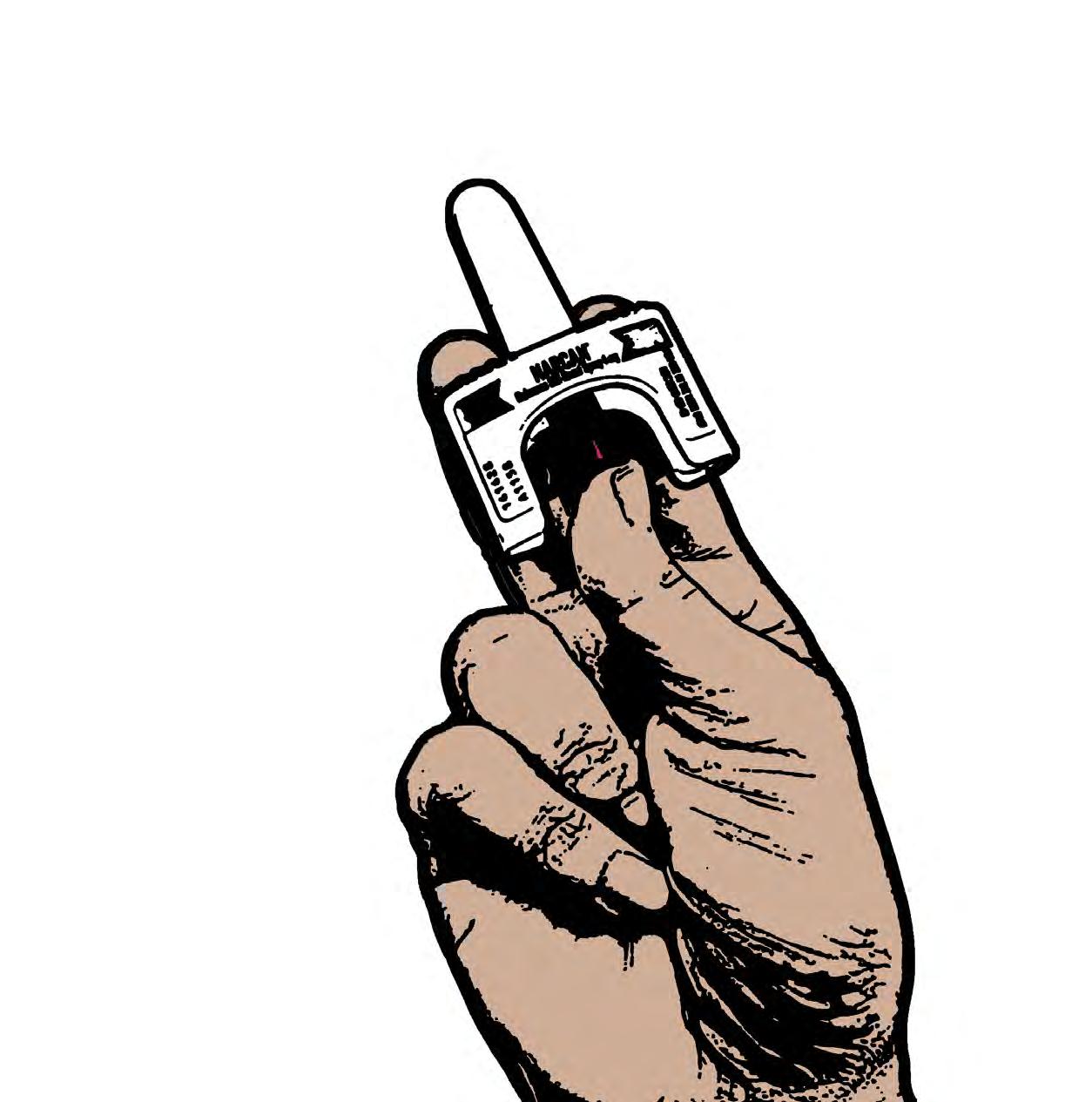

By Sam Robinson SENIOR REPORTER
The Michigan Court of Appeals ruled last week that the City of Detroit illegally approved a 2022 contract to expand its use of the ShotSpotter gunshot-detection technology.
The court said the city failed to comply with its own 2021 surveillance ordinance, which requires specific community input procedures outlining how the technology works.
“Given the inherent invasiveness of surveillance technology, the City adopted specific procedural requirements that must be met when procuring such technology. These requirements were not met,” Judge Kristina Robinson Garrett and Judge Brock Swartzle wrote in the opinion. “With surveillance and similar technology ever encroaching into every recess of modern life, procedural safeguards cannot be ignored or downplayed by government actors as mere technicalities.”
The ruling stems from a lawsuit from Detroit residents and the James and Grace Lee Boggs Center to Nurture Community Leadership, a nonprofit organization. Defendants include the City and several of its officials involved the procurement of the ShotSpotter technology.
It’s the latest development in the controversy over the police surveillance tool that police accountability experts and community activists say is an invasion of civil liberties and doesn’t work.
In November 2022, plaintiffs sued defendants to invalidate the contracts, seeking declaratory relief, mandamus, and injunctive relief. Plaintiffs alleged that DPD failed to make a surveillance report available on the city website 14 days before the required hearings and meetings and that the DPD’s responses in the report were inadequate.
The court agreed, prior to Sept. 28

the date the city was required to post the report, there were several key committee meetings and formal sessions of the City Council, during which requests to extend and expand the ShotSpotter technology were discussed— including the session during which the City Council approved the Extension Contract.
The City Council also continued to discuss the Expansion Contract on October 4, 2022, fewer than 14 days after the posting, though approval of the expansion contract was ultimately delayed a week.
“Thus, the record confirms that defendants repeatedly violated the requirement that the STSR “be made available on the City’s website at least 14 days prior to holding any of the hearings or meetings” identified elsewhere in that Ordinance,” the panel of judges wrote.
In a statement to press, the city’s top lawyer, Detroit corporation counsel Conrad Mallet, said the city can continue to use Shotspotter despite the court ruling.
“In its opinion, the Court of Appeals recognized the City of Detroit’s defenses to the lawsuit that may result in another dismissal by the trial court,” Mallett said.
Police leaders have defended the use of the tool, saying they’ve seen reductions in crime in areas where ShotSpotter microphones have been installed. They also say the audio taken from the gunshot detection
Diamonds and Orchards Gala Honors Decades of Service in Detroit
On November 22, Lambda Chi Chapter of Chi Eta Phi Sorority, Incorporated will mark a remarkable milestone—sixty years of service, education, and sisterhood in Detroit. The chapter has spent six decades uplifting the community, fostering leadership, and advancing professional nursing. Generations of members have committed to health promotion, mentorship, and civic engagement.
To commemorate this anniversary, the Sorority will host the Diamonds and Orchards Gala at St. John’s Armenian Church from 6:00 to 11:00 p.m. This elegant affair promises an evening of celebration, connection, and reflection. Guests will enjoy fine dining, lively entertainment, and tributes to the chapter’s legacy. The event will bring together members, alumni, and supporters rich in a tapestry of service and achievement.
For additional information please contact committee chairs Bevely Roberts at Bevelyr@aol.com or Beverly Baul @ bbturtle7273@gmail.com

monitoring system is not being used to spy on innocent residents. DPD policy states that recorded audio shall only be reviewable when pertinent to an active investigation
involving a firearm discharge. Judge Kirsten Frank Kelly dissented from the majority opinion, arguing there wasn’t legal standing to challenge the decision since plaintiffs failed to show how Detroit’s violation of the ordinance caused them harm.
Kelly also disagreed with the characterization of ShotSpotter as surveillance technology despite that being its stated purpose. She said it is “no different than an individual overhearing the sound of a gunshot and making a call to the police, or a device that registers and records the speed that a car is traveling on the road.”
You can reach Sam at srobinson@ michronicle.com.
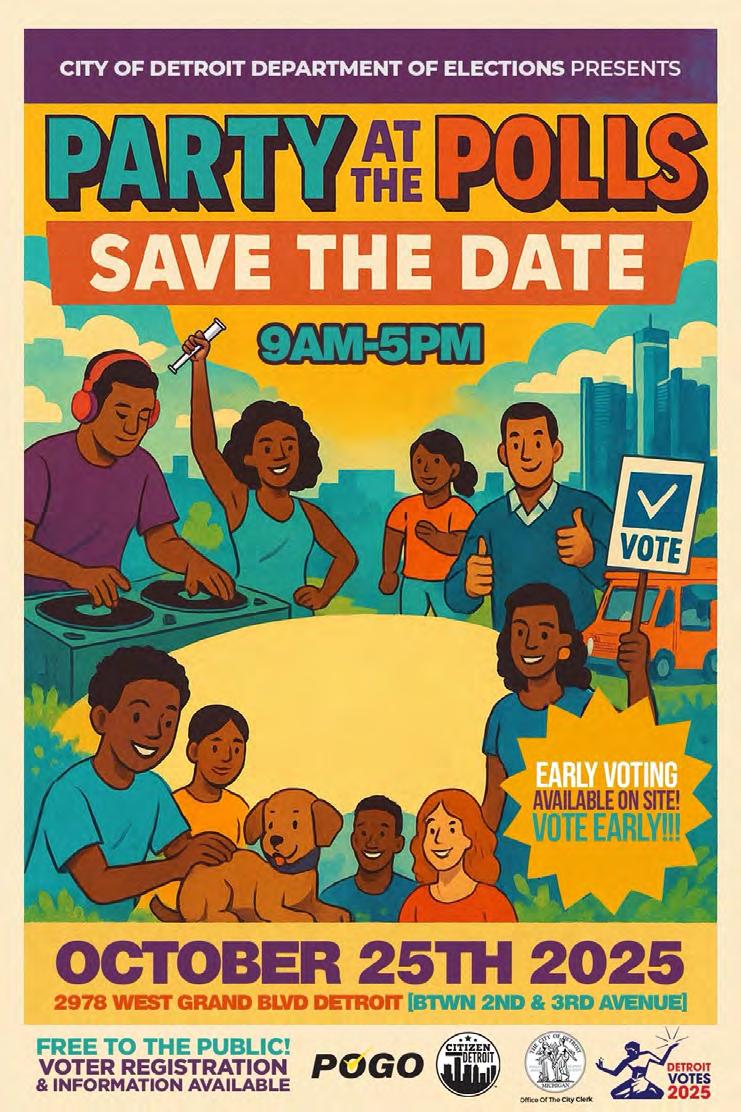
$0 premium Medicare Advantage plan from Trinity Health Plan of Michigan (HMO) is on a mission to make health care easier for YOU. As a not-for-profit organization, we’re committed to delivering compassionate care to everyone in our community.
$0 Tier 1 prescription drugs
Dental, vision and hearing coverage
And so much more!

through
September 2 to March 31, 8 a.m. to 8 p.m., seven days a week. Trinity Health Plan of Michigan (HMO) is a Medicare Advantage organization with a Medicare contract. Enrollment in Trinity Health Plan of Michigan depends on contract renewal. Benefits vary by county. To file a
Medicare. Not all plans have $0 Premium, Cash Back ($1,785.60
or providers are available in the plan’s network. ATENCIÓN: Si habla español, tiene a su
servicios gratuitos de asistencia lingüística. Llame al 888-546-2834 (TTY: 711). 注意:如果您使用繁體中文,您可以免費獲得語言援助服務。請致電 888-546-2834 (TTY: 711). 11337(10/25)DP-MI Y0164_AEPROPDivMI26_M PRJ-11030



Ed Siaje President, Bank of



“This is a platform that does not just report culture, it has helped define it.” — Chloe Gibert
Baller Alert has announced the appointment of Detroit native Chloe Gibert as its new Chief Marketing Officer. Known for her innovative approach and intentional storytelling, Gibert brings a proven record of success and a unique ability to blend creativity with strategy.
Baller Alert is one of the most influential digital media platforms in entertainment. The company reaches more than 18 million combined social media followers and generates over 1.2 billion monthly impressions across Instagram, Facebook, X, TikTok, and other platforms.

The brand delivers entertainment news, exclusive interviews, and original content that engages and inspires its Gen Z and millennial audiences, both online and through its dedicated Baller Alert App.
In her new role, Gibert will oversee brand partnerships, platform growth, storytelling, data strategy, and community building, ensuring that Baller Alert continues to connect culture with commerce.
“Stepping into the role of Chief Marketing Officer means I am part of shaping the brand’s vision, not just how it looks or sounds, but how it moves,” says Gibert. “My role touches everything from brand partnerships and platform growth to storytelling, data strategy, and community building. I help guide the connection between culture and business, making sure that every campaign, collaboration, and piece of content reflects both our audience’s reality and our creative ambition.”
For Gibert, Baller Alert represents much more than entertainment. It is a cultural pulse that reflects and shapes today’s conversations.
“I have followed the brand for years and admired how it has remained authentic, bold, and community-driven in an industry that changes every day,” she explains. “What drew me in most is that it is female founded and led, combined with its reach and impact. This is a platform that does not just report culture; it helps define it. Taking on this role allows me to expand that legacy and build new bridges between media, entertainment, and social impact.”
Before joining Baller Alert, Gibert made her mark in global marketing, contributing to campaigns for Adidas and Claire’s, as well as working with boutique agencies and major networks including Edelman and McCann. Throughout her career, she has focused on uniting creative and strategy teams to deliver clear, cohesive, and compelling campaigns.
At Adidas, Gibert helped improve collaboration among go-to-market, merchandising, and strategy teams to strengthen creative alignment across digital and experiential channels. During her time at Claire’s, she supported the brand’s refresh by managing creative development for seasonal campaigns and digital content, connecting internal teams with external partners to bring new concepts to life on time and within budget.
Gibert describes marketing as the ability to tell stories with strategy, transforming values, vision, and voice into narratives that people genuinely care about. With her creative leadership, thoughtful approach, and passion for culture, she is poised to lead Baller Alert into a new era of innovation and influence.
“This moment is not just about a title; it is about stewardship,” says Gibert. “I am stepping into a role that carries legacy, influence, and responsibility to both inspire and inform. My goal is to ensure that every move we make leaves the culture better than we found it, smarter, louder, and more connected.”
By Rainbow PUSH Global Automotive Project
The importance of establishing and maintaining longterm relationships between automakers and their minority-owned suppliers and dealers was the central theme of the 26th annual Global Automotive Summit in Detroit on Oct. 15.
Now in its 26th year, the summit, founded by the Rainbow PUSH Coalition in conjunction with Citizenship Education Fund, is designed to serve as an industry conference that fosters partnerships – a mission that is even more important in an era when diversity, equity and inclusion programs have been under attack.
Throughout the day, speakers made the case that partnering with minority communities in everything from purchasing and vehicle design to sales and marketing is a smart business strategy that leads to success.
Marc Bland, head of new business development and growth audiences for S&P Mobility, reminded the attendees that U.S. Census figures project that Asian, Black and Hispanic populations will collectively represent the majority of U.S. citizens by 2045. That means that automakers that struggle to sell products that appeal to those minority groups will increasingly be at risk of losing market share as the demographics continue to evolve.
The percentage of new vehicles purchased annually in the U.S. by Blacks, Asians & Hispanics will increase from 32% this year to 40% by 2033, according to purchasing forecasts compiled by S&P Mobility – and savvy automakers will find a way to capitalize on that sales growth.
“It’s all about opportunity,” Bland said.
Because of population growth, Hispanic consumers are now the dominant consumer demographic in major cities in California, Texas and Florida, said Perry Watson, Presi-

By: Ebony JJ Curry SENIOR REPORTER
Long before galleries recognized Black artists as visionaries, before critics placed their names beside those of Monet or Picasso, our ancestors painted, sculpted, quilted, and created — not for validation, but for survival, for joy, and for truth. From brushstrokes on southern church walls to murals that colored the struggle of the Great Migration, Black art has always been a record of resistance and rebirth.
Now, the Detroit Institute of Arts (DIA) is ensuring that legacy has a home of its own.
Saturday, October 18, the museum opened its long-awaited African American art galleries, Reimagine African American Art — four rooms adjacent to the famed Rivera Court that chronicle the journey of Black artistry from 1840 to 1986. It is the culmination of generations of struggle and brilliance, told through fifty works that illuminate the vastness of African American history: from Reconstruction to the Harlem Renaissance, from Social Realism to the Civil Rights Movement and the unapologetic rise of the Black Arts era.
At the heart of this new beginning stands Robert S. Duncanson, the first known Black artist to have created a painting of Uncle Tom while living in the Detroit area. His 1853 piece, Uncle Tom and Little Eva — commissioned by an editor for The Detroit Tribune — is both haunting and historic. In it, Duncanson, a free Black man, interprets Harriet Beecher Stowe’s abolitionist story through the eyes of one who lived its consequences.
Black artists began translating freedom into visual form, chronicling the promise and betrayal of emancipation. The 1920s Harlem Renaissance transformed that expression into a cultural explosion, painters like Aaron Douglas and sculptors like Augusta Savage merging African tradition with modern defiance.
Their work was not just aesthetic; it was political, declaring that Black identity was art in itself.
By the mid-20th century, Social Realism emerged, giving voice to Black workers, mothers, and communities battling Jim Crow’s brutality. Art became activism — brush and chisel as protest signs. Then came the Civil Rights era, when figures like Jacob Lawrence and Romare Bearden translated marches and sermons into visual symphonies. Out of that energy grew the Black Arts Movement, led by artists who refused the margins, forging their own institutions and aesthetic standards rooted in liberation and self-definition.

Nearly two centuries later, the painting now opens the DIA’s new African American art section — a spiritual entryway into a lineage that began long before it was ever welcomed in American museums.
Valerie Mercer, the DIA’s curator and head of its Center for African American Art, calls the moment “a restoration of balance.” For decades, Black art was either overlooked or framed as supplementary to American art — never as its foundation. “Detroit’s majority African American community deserves to see their culture represented and respected here,” Mercer said, noting that the city’s artistic pulse has always mirrored the rhythm of its people.
That rhythm began pulsing through galleries long before mainstream institutions took notice. During Reconstruction,
Detroit was never far from that story.
The city’s own Allie McGhee, whose vibrant abstractions now hang in the DIA’s galleries, has long captured the spiritual geometry of Black life. Hale Woodruff’s murals, Augusta Savage’s sculptures, and Thomas Day’s handcrafted furniture speak to eras when creation was an act of faith. Together, their works form a continuum — a reminder that African American art is not a chapter in American history, but its heartbeat.
DIA Director Salvador Salort-Pons described the new galleries as a testament to that power.
“These four galleries bring together powerful artists and voices that illuminate crucial moments in the history of this country,” he said during Wednesday’s preview. Each room, he added, invites visitors to witness art not as spectacle, but as testimony, a visual archive of endurance, imagination, and identity.
The installation, organized by the Center for African American Art, stands as a milestone in the museum’s evolving relationship with Detroit’s Black community. The DIA began collecting African American art in 1943 — a bold act for its time — and in 2000, it founded the Center itself.

dent National Association of Minority Automobile Dealers (NAMAD).
“While there is a mandate and an executive order on DEI…the Hispanic consumer, between 2010 and 2020 –their consumer (buying) power grew to $1.9 trillion. That’s almost 87% growth,” Watson said. “So, while you can focus on trying to move away from DEI, as far as color is concerned, if you’re interested in green, you cannot ignore inclusive economics.”
Watson also said that there were a total of 1,600 minority-owned dealerships at the end of 2024 – a total gain of 94 since the end of 2023.
One year later, Mercer became the first curator in an encyclopedic American museum dedicated solely to African American art. That leadership has now culminated in this reimagined space, designed not as an annex, but as a central experience positioned beside Diego Rivera’s Detroit Industry Murals, creating a dialogue between labor, identity, and liberation.
The DIA’s Chairman of the Board, Lane Coleman, announced an ambitious goal to raise a $16 million endowment to support the galleries, with $4 million already secured. It’s an investment not only in art, but in acknowledgment — a long-overdue recognition of Black creators who shaped the very visual language of America.
tury brush meets McGhee’s abstract forms is to stand inside history, to feel the arc of time between bondage and boundlessness.
It is a gallery, yes, but also a gathering: of ancestors, of ideas, of visions that refused erasure.

“I think this is incredible. What we’re doing here is phase one of the rollout,” said Coleman. “What people don’t realize, is that we’re going to start these galleries from the early 1800s to 1980 and then all the artist from 1984 will be going into the modern and contemporary galleries because great African American artist don’t want to be considered, Black great artist, they want to be considered as great artist.”
For many Detroiters, this opening carries generational weight. To walk into a room where Robert Duncanson’s 19th-cen-
“A lot of people think that when we brought in Tiff Massey that we started to move this around,” Coleman shared. “But the DIA had this in their plan for the last four years. This is just part of a big picture plan that they were working on so, I have to tip my hat off to the team and staff here for being so forward thinking.”
From quilts that told escape routes on the Underground Railroad to murals that turned blight into beauty, Black art has always been the mirror through which America must face itself. It has narrated our collective journey through chains, church pews, factories, and streets — insisting on our presence when the world sought to forget.
The Detroit Institute of Arts’ Reimagine African American Art galleries invite the nation to remember, to see, finally, what Black artists have always known: that art is our freedom made visible.
The galleries open to the public Saturday, October 18, at 5200 Woodward Avenue. Admission is free for residents of Wayne, Oakland, and Macomb counties.

580 flex card * annually for retail over-the-counter, copays associated with the plan and more.
Choosing a Medicare Advantage plan doesn’t have to be confusing. Let HAP do the heavy lifting and enjoy peace of mind knowing you’ll be covered for all your essential health needs.
Open enrollment felt overwhelming with all the ads and options. Reaching out to HAP was the best decision. Their representatives patiently explained the plans, and I ended up with better dental and medical coverage while saving money each month. Highly recommend HAP! - Connie N., Clinton Twp win contracts with automakers.
Marvin Washington, vice president of purchasing at Stellantis, said the Auburn Hills automaker is always open to meeting with and getting to know new suppliers with new ideas. However, he also made it clear that the bar is very high for a contract and compared the challenge to making it onto the roster of a professional sports team.
“If you come to the Lions and you wanna play a running back, you can’t just say, I play running back,” Washington said. “You gotta be better than Jahmyr Gibbs. So you gotta bring something unique, or different.”
Ryan Grimm, Toyota’s group vice president of purchasing and supplier development, said Toyota has a philosophy of maintaining an “open-door policy,” –meaning the company is generally willing to meet with any supplier.
“But the reality is, you know, our supply base is difficult to get into…if you’re coming to us with something that is already being done by somebody else who’s performing very well, yes, it’s gonna be challenging to get in,” Grimm said.
“We openly admit that. But that doesn’t mean we’re not gonna meet with you.”
the early 1980s. Toyota, more than other automakers, is also known for working with troubled suppliers rather than letting them fail, which further reduces the chances of new suppliers winning business with the automaker.
From page B-1 HAP769600 9/2025
Grimm also explained that Toyota has been doing business in the U.S. since the 1950s and began building a supplier network in
But Grimm and Washington also said the automotive industry is changing rapidly and is facing a critical threat from Chinese automakers that have found ways to produce high quality vehicles at lower prices.
“We’re trying to find that unique superstar player, just like sports teams do,” Washington said. “We’re spanning the globe to find the best suppliers for ideas or solutions to make our cars better and more effective from a commercial perspective and more attractive to our consumers.”
Medicare Annual Enrollment Period ends December 7 Oct. 1 – March 31 8 a.m. to 8 p.m. Seven days a week April 1 – Sept. 30
*Flex card with rollover to help with certain expenses. Health Alliance Plan (HAP) has HMO, HMO-POS, PPO plans with Medicare contracts. Enrollment depends on contract renewal.
H2354_HMO 2026 Oct Nov Home Print_M


The Detroit Public Schools Community District is seeking proposals for Owner Representative Services for Athletic Field Upgrades under RFP 26-0176.
There will be a non-mandatory pre-bid proposal conference for this RFP hosted virtually on Monday, October 27, 2025 at 9:30 a.m. The conference can be viewed using the following link: https://tinyurl.com/37yh39vv
The call-in information is as follows:
Call in #: +1 313-462-2305
Conference ID: 264 265 206#
Proposals are due by 12:00 p.m., November 12, 2025. Late proposals will not be accepted.
All bids must be accompanied by a sworn and notarized statement disclosing any familial relationship that exists between the submitting company and any employee of DPSCD. DPSCD shall not accept a bid that does not include this sworn and notarized disclosure statement.
If you have questions, please contact the Procurement Department at (313) 873-6531.

The Detroit Public Schools Community District is seeking proposals for subcontractors under RFP 26-0175 DPSCD
Carsten Elementary-Middle School.
Architect/Engineer: Kingscott 905 Trade Centre Way, Suite 130 Portage, MI 49002
Construction Manager: Rockford Construction Co. 601 First Street NW Grand Rapids, MI 49504
There will be a non-mandatory Pre-Bid conference for this RFP that will take place virtually on October 29, 2025 at 12:00 p.m. The meeting can be accessed at the below link.
https://tinyurl.com/bdcsph67
Call-In: (313) 462-2305
Conference ID: 884 427 011#
The due date for Proposals is November 14, 2025 at 12:00 p.m.
Proposals must be submitted electronically via Building
Connected by due date and time. Late bids will not be accepted.
The Public Opening will occur virtually at 12:00 p.m. on November 14, 2025, and can be viewed at the below link:
https://tinyurl.com/32henast
Call-In: (313) 462-2305
Conference ID: 514 730 339#
This Project is subject to Michigan State Prevailing Wage Laws (Michigan Public Act 10 of 2023) and the Contractor must pay prevailing wages and fringe benefits to all of Contractor’s, and is subcontractors’, construction mechanics working on the Project in accordance with Michigan Public Act 10 of 2023. All bids must be accompanied by a sworn and notarized statement disclosing any familial relationship that exists between the submitting company and any employee of DPSCD. DPSCD shall not accept a bid that does not include this sworn and notarized disclosure statement. A bid bond in an amount not less than five percent (5%) of the base bid is also required.
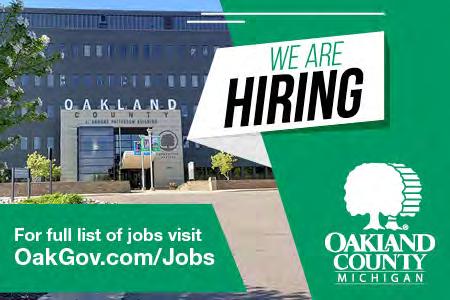

PUBLIC HEARING NOTICE CITY OF HIGHLAND PARK, MICHIGAN
Notice of Public Hearing – Sign Variance Application at 15004 3rd Street
A Sign Variance has been requested on behalf of Elevate Sign Group. The City of Highland Park Zoning Board of Appeals will hold a Public Hearing during its
meeting on Thursday, November 13, 2025, at 5:30 p.m.
Location: Highland Park Fire Station – Training Room
25 Gerald Street Highland Park, MI 48203
The purpose of this public hearing is to receive comments from the public regarding the proposed sign variance at the above location.
At least three (3) days prior to the meeting date, to request disability accommodations, or written comments, may be submitted in advance to:
Donovan Smith, City Planner
Email: dsmith@mcka.com
Mail: City Hall, 12050 Woodward Avenue, Highland Park, MI 48203
(StatePoint) Looking for a high-paying job in a growing profession? Here’s what to know about some of today’s top professions offering generous compensation and good job security: Health Care
The U.S. population is aging, and the demand for health-care professionals is growing. The Bureau of Labor and Statistics reports that nurse practitioners and physician assistants are among the top 20 fastest-growing professions nationwide, both earning median pay well over $100,000 per year. Trusted and valued by patients, peers and physicians, both career paths offer rich intangible rewards, along with long-term job security.
Financial Planning

A growing talent shortage in the financial planning profession means that this career path is likely one that will offer job security for years to come. In fact, a recent study by McKinsey & Co. predicts that by 2034, U.S. wealth management firms could be about 100,000 financial advisors short of the number needed to fulfill customer demand.
In particular, consumers and firms are actively seeking advisors who meet specific requirements; 81% prefer an advisor who takes all areas of their financial life into account and 90% see an advisor’s certifications as important. This
is why CERTIFIED FINANCIAL PLANNER® certification can give financial planners at any stage of their career a leg up. During the certification process, CFP® professionals develop deep subject matter expertise in everything from tax and estate planning to retirement income analysis and debt management.
With a median annual compensation of $185,000, financial planning is a job that pays well. And given the rigorous, comprehensive training CFP® professionals undergo, it’s no surprise they earn 13% more than other financial planners, and commonly receive generous benefits packages and other perks.
To learn more about the financial planning profession, along with the numerous career advantages CFP® certification affords, visit CFP.net.
Information Technology
With technologies such as machine learning, artificial intelligence (AI) and cloud computing being introduced into workplace processes, organizations will need freshly-minted information technology (IT) professionals with expertise in these areas to seamlessly implement these tools into their business models. At the same time, IT professionals are needed to protect companies from emerging cybersecurity threats. With a median salary of $169,510 and an unemployment rate at just 1.4%, according to U.S. News and World Report, IT managers are well-compensated and job-secure.
Whether you’re a young person investigating post-graduation opportunities or a mid-life career-changer, understanding industry trends can help you align your career goals with greater financial security.
is important, according to research from the Alliance to Save Energy, fewer than 35% consider their homes efficient.
“Now
Plus, heating and cooling account for 50-60% of total household energy use, and more than half of U.S. homes remain under-insulated with outdated HVAC systems. With colder weather on the way, a few smart changes now can pay off all winter long.
“Now is the ideal time to put efficiency in focus; and it isn’t about one big project, it’s about small steps that add up to comfort and savings,” said David Rames, senior product manager at Midea. “We want to empower homeowners with practical tools and modern technology to help them cut utility bills, improve comfort and take advantage of rebate programs that can make upgrades more affordable.”
Consider this expert-backed guidance from the experts at Midea to help improve home efficiency: Seal it up: Air leaks around windows, doors and attics can account for up to 30% of heating loss, according to the U.S. Department of Energy. Use weatherstripping and caulk to prevent waste. Adding attic insulation is another small investment that can lead to major energy savings.
Smarten your thermostat: A programmable or smart thermostat can automatically adjust heating schedules and save up to $180 per year.
Upgrade your filter: Replace HVAC filters monthly during

TUESDAY, NOVEMBER 4, 2025
For the purpose of voting for the following offices:
If you have any questions regarding your polling location on Election Day, please contact the Detroit Department of Elections at (313) 876-0190.
MICHIGAN LAW MANDATES ALL VOTERS TO PRESENT VALID PHOTO ID AT THE POLLS OR COMPLETE AN AFFIDAVIT OF VOTER NOT IN POSSESSION OF PICTURE IDENTIFICATION. Acceptable forms of photo IDs: Michigan Driver’s License or a Michigan Personal ID: Driver’s License or Personal ID by another state; Federal or State Government photo ID; U.S. Passport; Military ID with photo; current Student ID with photo or Tribal ID with photo. Absentee Ballots are available for all elections. Registered voters may obtain a ballot at the office of the Detroit Department of Elections, the office of the Detroit City Clerk or at any of our Early Voting Centers listed below.
WCCCD Northwest Campus 8200 W. Outer Drive Detroit, MI 48219
Northwest Activities Center 18100 Meyers Rd. Detroit, MI 48235
Farwell Recreation Center 2711 E. Outer Drive Detroit, MI 48234
WCCCD Eastern Campus 5901 Conner St. Detroit, MI 48213
HOURS OF OPERATION:
• Early Vote Centers open on Saturday, October 25, 2025
• Regular business hours: Monday through Friday from 9:00 A.M. to 5:00 P.M.
• Saturday, November 1st and Sunday, November 2nd from 9:00 A.M. to 5:00 P.M.
• Monday, November 3rd – voting ceases at 4:00 P.M.
Department of Elections
2978 W. Grand Blvd. Detroit, MI 48202 City Clerk’s Office (Coleman A. Young Municipal Ctr.) 2 Woodward Ave., Ste. 106 Detroit, MI 48226
Clark Park 1130 Clark St. Detroit, MI 48209
Adams Butzel Recreation Complex 10500 Lyndon Detroit, MI 48238
• Election Day, Tuesday, November 4th from 7:00 A.M. to 8:00 P.M. Voters may also submit their ballots by dropping it into any of our additional drop boxes (24 hours, 7 days a week) listed below.
Crowell Community Center 16630 Lasher Rd. Detroit, MI 48219
Rouge Park Golf Course 11701 Burt Rd. Detroit, MI 48228
North Rosedale Park Community House 18445 Scarsdale Detroit, MI 48223
Greater Grace Temple 23500 W. Seven Mile Rd. Detroit, MI 48219
Liberty Temple Baptist Church 17188 Greenfield Rd. Detroit, MI 48235
Greater Emmanuel Institutional COGIC 19190 Schaefer Hwy. Detroit, MI 48235
Tindal Recreation Center 10301 W. Seven Mile Rd. Detroit, MI 48221
Palmer Park Community Center 1121 Merrill Plaisance St. Detroit, MI 48203
Perfecting Church 7616 E. Nevada Detroit, MI 48234
Faith Temple 19000 Conant Detroit, MI 48234
Greater St. Paul 15325 Gratiot Ave. Detroit, MI 48205
Heilmann Recreation Center 19601 Crusade Detroit, MI 48205
Balduck Park 5271 Canyon Detroit, MI 48236
Bethany Lutheran Church 11475 E. Outer Drive Detroit, MI 48224
Franklin Library 13651 E. McNichols Detroit, MI 48205
Jesus Tabernacle Church 11001 Chalmers Detroit, MI 48213
Considine Center 8904 Woodward Ave. Detroit, MI 48202
Greater Christ Baptist Church 3544 Iroquois Ave. Detroit, MI 48214
Horatio Williams Foundation 1010 Antietam Ave. Detroit, MI 48207
Renaissance Baptist Church 1045 E. Grand Blvd. Detroit, MI 48207
Butzel Family Center 7737 Kercheval Detroit, MI 48214
Detroit Pistons Performance Center 690 Amsterdam St. Detroit, MI 48202
WCCCD Downtown Campus 1001 W. Fort St. Detroit, MI 48226
Unity Baptist Church 7500 Tireman Detroit, MI 48204
Kemeny Recreation Center 2260 S. Fort St. Detroit, MI 48217
Davison Service Yard 8221 W. Davison Detroit, MI 48238
William S. Ford Memorial Church 16400 W. Warren Detroit, MI 48228
Christ Temple Baptist Church 10628 Plymouth Rd. Detroit, MI 48204
Library 18400 Joy Rd. Detroit, MI 48228























